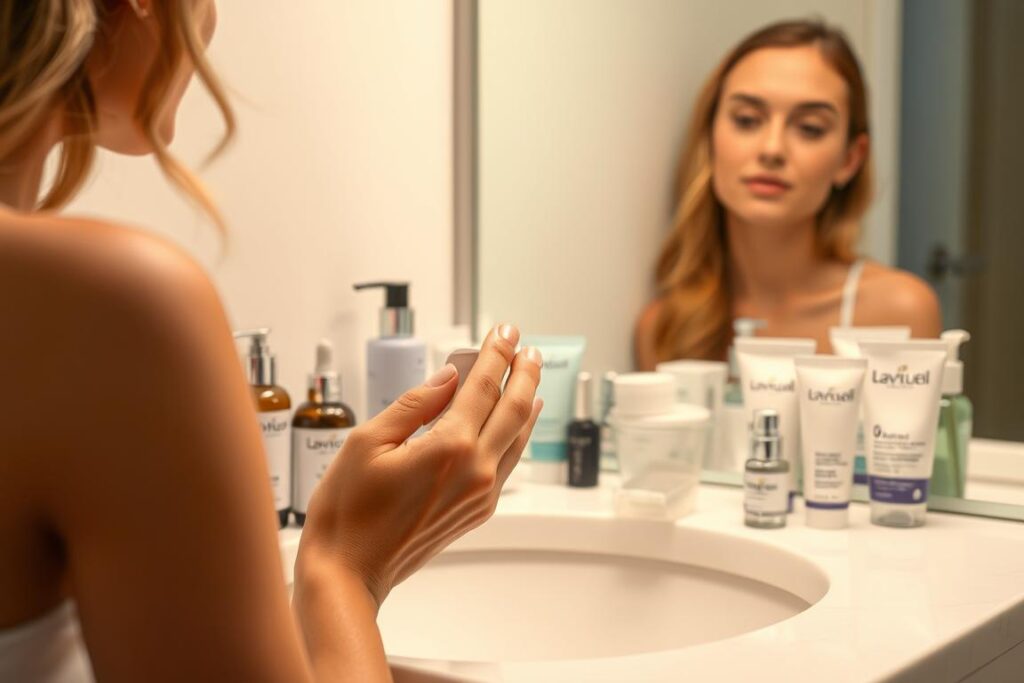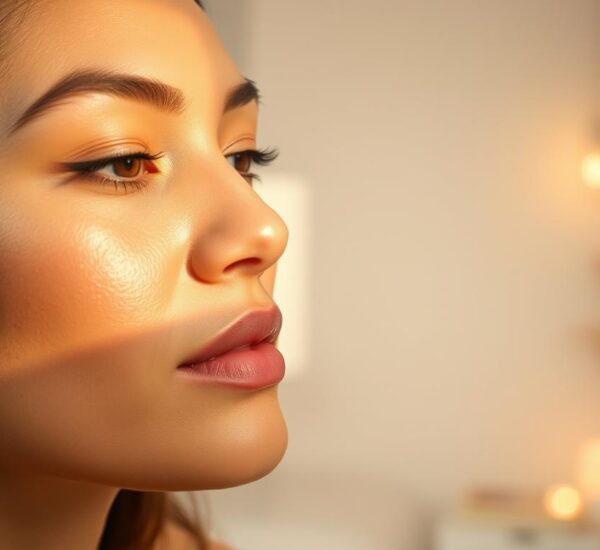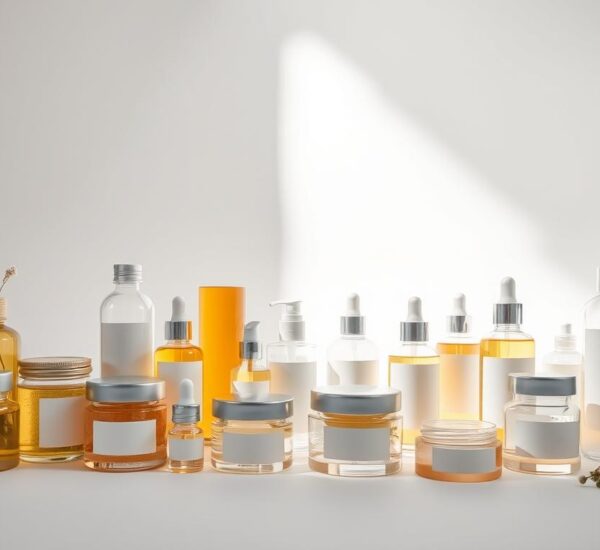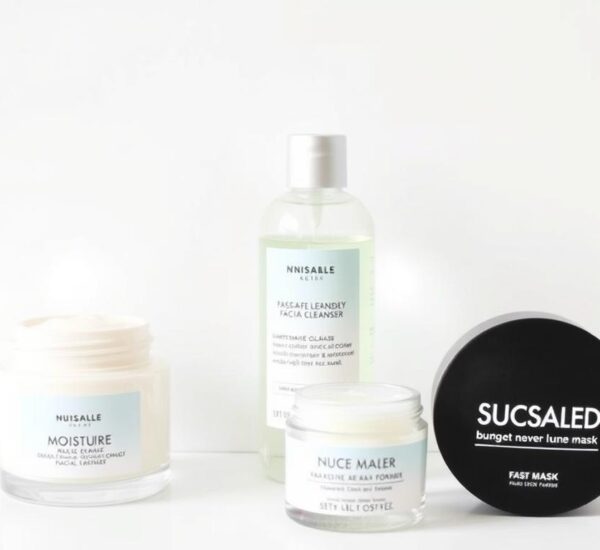Many people dream of glowing skin. It begins with a regular beauty routine. Taking care of your skin boosts your confidence and looks.
We’ll show you how to get your skin to glow. We’ll talk about the key skincare steps. This includes knowing your skin type and picking the right products.
Our top tips will lead you to healthier, brighter skin. No matter your skin issues, we’ve got you covered. Our guide is here to help you tackle any skin problem.
Key Takeaways
- Understand your skin type to choose the right products.
- Establish a consistent beauty routine for optimal skin health.
- Protect your skin from the sun to prevent damage.
- Moisturize regularly to keep your skin hydrated.
- Incorporate natural ingredients into your skincare regimen.
Understanding Your Skin Type
Knowing your skin type is the first step to glowing skin. It helps you pick the best skincare products for your skin. This way, you can tackle problems like acne, dryness, or sensitivity better.
There are mainly three skin types: oily, dry, and combination. Each needs a special care plan for skin health.
Oily Skin
Oily skin makes your face shiny and can lead to acne. It’s smart to use non-comedogenic or “oil-free” products to avoid clogged pores. A dermatologist-recommended cleanser can help manage oil and reduce acne.
Dry Skin
Dry skin feels tight and flaky because it can’t hold moisture. To keep it moist, use products with hyaluronic acid or ceramides. These help keep moisture in and fix the skin’s barrier.
Combination Skin
Combination skin has oily T-zone and dry cheeks. You need a balanced skincare routine. Use products that control oil in the T-zone and moisturize the dry cheeks. This balance is key for skin health.
Understanding your skin type and choosing the right skincare routine can greatly improve your skin. It’s about finding the right balance and using dermatologist-recommended products for radiant, healthy skin.
Essential Skincare Ingredients
To get the most out of your skincare, knowing key ingredients is key. The right mix of natural ingredients can greatly improve your skin’s health and look.
Some ingredients offer amazing benefits. For example, hyaluronic acid is great at keeping moisture in. It can hold up to 1000 times its weight in water, making it perfect for keeping your skin hydrated.
Hyaluronic Acid
Hyaluronic acid is a powerful tool for your skin. It keeps moisture in and helps your skin stay elastic and firm. Its ability to hold water makes it a must-have in many products for hydration and anti-aging.
Retinol
Retinol, a vitamin A derivative, is also very effective. It helps your skin cells renew, reducing fine lines and wrinkles. Using retinol regularly can make your skin look smoother and younger.
Vitamin C
Vitamin C is a strong antioxidant that brightens your skin. It also helps protect your skin from the environment. Plus, it’s great for making collagen and fading dark spots, leading to a brighter, more even-toned skin.
Let’s look at how these ingredients compare:
| Ingredient | Primary Benefit | Additional Benefits |
|---|---|---|
| Hyaluronic Acid | Moisture Retention | Enhances skin elasticity and firmness |
| Retinol | Anti-aging | Promotes cell turnover, improves skin texture |
| Vitamin C | Antioxidant | Brightens skin, fades hyperpigmentation |
Adding these essential ingredients to your skincare routine can greatly enhance your skin’s health and look. Always choose products that highlight these natural ingredients to get the most benefits for your skin.
Daily Skincare Routine Steps
Creating a daily skincare routine is key for glowing skin. It keeps your skin healthy and looking good. It also fights off environmental damage.
Start with a simple, three-step plan. This includes cleansing, toning, and moisturizing. Together, they make a great beauty routine.
Cleansing
Cleansing is the first step. It removes dirt, oil, and makeup. This makes your skin ready for other products. Use a gentle cleanser that fits your skin type.
- Choose a cleanser that suits your skin type (gel, cream, or foam).
- Massage the cleanser onto your face for about 30 seconds.
- Rinse thoroughly with lukewarm water, then pat dry.
Toning
Toning balances your skin’s pH and gets it ready for moisturizer. It also removes extra dirt. Use a cotton pad with toner and gently sweep it across your face.
- Select a toner that addresses your specific skin concerns (acne, dryness, etc.).
- Gently sweep the toner across your face and neck.
- Allow the toner to dry before proceeding to the next step.
Moisturizing
Moisturizing is the last step. It locks in previous products and protects your skin. Pick a moisturizer that matches your skin type for hydration and nourishment.
- Choose a moisturizer with ingredients beneficial for your skin type.
- Apply the moisturizer while your skin is slightly damp.
- Don’t forget to apply sunscreen during the day as part of your beauty routine.

By following these steps daily, you can get healthier, glowing skin. Remember, being consistent is the secret to lasting results.
The Importance of Sunscreen
Sunscreen is key for any skincare routine. It protects against early aging and skin cancer. It blocks UV rays from the sun, preventing wrinkles and age spots. Using sunscreen daily keeps your skin looking young and healthy. Choose a broad-spectrum sunscreen with SPF 30 or higher.
Choosing the Right SPF
SPF is very important when picking a sunscreen. SPF measures how well a sunscreen protects against ultraviolet B (UVB) rays, which cause sunburn and damage. Most people need a broad-spectrum sunscreen with SPF 30 or higher. This blocks 97% of UVB rays. If you have fair skin or are outside a lot, use a higher SPF.
Application Tips
Applying sunscreen right is as important as picking the right one. Apply sunscreen generously to all exposed skin 15-30 minutes before going outside. Remember to cover often-overlooked areas like the tops of your ears and the back of your neck. Use enough for an average adult, about one ounce per application.
Reapplication Guidelines
Sunscreen needs to be reapplied often to stay effective. Reapply sunscreen every two hours or immediately after swimming or sweating. This keeps your skin protected from UV rays. If you’re outside a lot, set reminders to reapply on time.
| Activity | Reapplication Interval | Additional Notes |
|---|---|---|
| Outdoor Activities | Every 2 hours | More frequently if swimming or sweating |
| Swimming | Immediately after | Use water-resistant sunscreen |
| Sweating | Immediately after | Reapply even if water-resistant |
Understanding sunscreen’s importance, choosing the right SPF, applying it correctly, and reapplying as needed boosts your skin’s health. Make sunscreen a must-have in your daily skincare routine for healthier, more resilient skin.
Seasonal Skincare Adjustments
Changing your skincare routine with the seasons is key for healthy skin. Our skin’s needs change with the weather.
Our skin faces different challenges all year. From dry winter air to humid summers. Knowing these changes helps us adjust our beauty routine for our skin’s needs.
Summer Tips
In summer, use lightweight, oil-free products to control oil and avoid clogged pores. Choose products marked “non-comedogenic” or “oil-free.” For tips on making your own skincare, check out our guide on homemade rosehip oil serum.
- Drink lots of water to stay hydrated.
- Apply broad-spectrum sunscreen with high SPF.
- Exfoliate often to get rid of dead skin cells.
Winter Essentials
Winter’s dry air can dry out your skin. Use moisturizing products to keep your skin moist and protect it from cold.
- Use a humidifier to add moisture to the air.
- Apply thick moisturizer or facial oil to keep moisture in.
- Avoid harsh products that take away your skin’s natural oils.
Fall and Spring Considerations
Fall and spring weather is unpredictable. Be ready to adjust your skincare routine for these seasons. In fall, start using more moisturizers for winter. In spring, remove winter dryness and adjust to warmer weather.
Use products with natural ingredients in both seasons. They help balance your skin without irritation. It’s also a good time to check your skincare products and make changes if needed.
Common Skincare Mistakes to Avoid
To keep our skin healthy and glowing, we must avoid common mistakes. A good skincare routine can be ruined by simple errors. These mistakes can cause skin problems. Let’s look at these errors and how to dodge them to keep our skin in top shape.
Over-exfoliation
Over-exfoliating takes away our skin’s natural oils, causing dryness and irritation. Exfoliating is key, but we must do it carefully. We should exfoliate only once or twice a week, based on our skin type.

Skipping Sunscreen
Not using sunscreen can cause early aging and even skin cancer. It’s a vital part of our daily skincare. We should pick a sunscreen with the right SPF for us and apply it every day, even on cloudy days.
Neglecting Hydration
Ignoring hydration makes our skin look dull and lifeless. Drinking enough water is key for skin health. We need to stay hydrated by drinking lots of water all day.
The Role of Diet in Skincare
Eating the right foods is as important as using the right skincare products. A diet full of fruits, vegetables, and whole grains gives your skin the nutrients it needs. Drinking plenty of water is also key to keeping your skin elastic and removing toxins.
Hydration and Skin Health
Drinking enough water is vital for healthy skin. It keeps your skin moist from the inside out, making it look better. Proper hydration also helps your skin stay elastic, which reduces wrinkles and fine lines.
Foods for Radiant Skin
Eating foods full of antioxidants, like berries and leafy greens, protects your skin from harm. Foods with omega-3 fatty acids, such as salmon, help your skin by fighting inflammation. For more tips on skincare, check out our article on DIY turmeric face masks that can naturally reduce acne scars.
Supplements to Consider
Even with a good diet, some supplements can help your skin. Omega-3 fatty acids and vitamin D supplements are good for your skin. But, always talk to a doctor before starting any new supplements.
Holistic Approaches to Skincare
To truly unlock your skin’s full power, you need to look at both what you put on your skin and what you do inside. A holistic approach to skincare means more than just using the right products. It’s about making choices that boost your overall health.
Managing stress is key. Too much stress can cause inflammation, which harms your skin. Activities like meditation, yoga, or deep breathing can help lower stress and make your skin healthier.
Managing Stress for Better Skin
Stress can cause problems like acne and rosacea. Adding stress-reducing activities to your day can make your skin better.
The Importance of Quality Sleep
Getting quality sleep is essential for your skin’s repair and growth. While you sleep, your body fixes and refreshes your skin, making it look better and brighter.
Regular Exercise for Glowing Skin
Regular exercise boosts blood flow. This helps your skin get the oxygen and nutrients it needs, making it healthier and more vibrant.
| Holistic Practice | Benefits for Skin |
|---|---|
| Stress Management | Reduces inflammation, prevents skin issues like acne |
| Quality Sleep | Enhances skin repair and regeneration |
| Regular Exercise | Improves circulation, delivering oxygen and nutrients to the skin |
Adding these holistic practices to your life can lead to a brighter, healthier complexion. They work well with your skincare routine.
Consulting a Professional
Keeping up with a skincare routine and holistic methods can help your skin stay healthy and bright. But, sometimes you might need to see a professional. If you’re dealing with ongoing skin issues, it’s key to visit a dermatologist. They should be recommended by your doctor or trusted skincare experts.
Determining the Right Time for a Dermatologist Visit
Knowing when to get professional help is important. If you’re using many skincare products but your skin issues persist, like acne or hyperpigmentation, a dermatologist can help. They offer personalized advice and treatments.
Benefits of Professional Skincare Treatments
Professional treatments, like chemical peels and microdermabrasion, can tackle specific skin problems. Seeing a dermatologist ensures your skin gets the care it needs. This keeps it healthy, glowing, and radiant.
Preparing for Your Consultation
Before your dermatologist visit, be ready. Share your skincare routine, medical history, and concerns. This helps you get the best advice and treatment.



